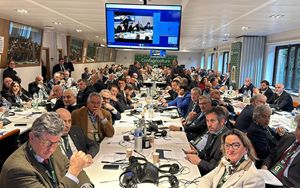(Finance) – “The time for in-depth analysis and online consultations has expired. We have presented our proposals for a profound bureaucratic simplification and for safeguarding the productive potential of companies”. “Now it is up to the institutions to give an effective response to the expectations of the Italian and European agricultural world no later than March. Otherwise, protests and street demonstrations are destined to increase.” It is the message launched by president of Confagricoltura, Massimiliano Giansanti, at the opening of the extraordinary assembly of the organization which is underway in Brussels, in conjunction with the meeting of the Agriculture Council of the EU.
“For Confagricoltura – continues Giansanti – the limits of the CAP in force since last year were immediately evident. To apply the new legislation, national administrations had to draw up strategic plans of thousands of pages. Bureaucratic requirements have increased dramatically in the face of decreasing financial resources and the exceptional rise in inflation has increased the difficulties of farmers. There has been a lot of discussion about the EU budget for agriculture, but direct aid from the CAP is now reduced to 120 euros on average per hectare.”
“The upcoming deadline of the European legislature makes the modification of the basic acts of the CAP extremely complicated, but alternative paths exist”, underlines the president of Confagricoltura. “In the event of emergencies and causes of force majeure, the sanctions provided for in the event of non-compliance may be suspended. From the pandemic to the economic impact of Ukraine’s aggression, up to the recent crisis in the Middle East, Italian and European agriculture is in emergency for over three years.”
“In addition to the glaring limitations of the CAP, the sector is grappling with the consequences of the unprecedented rise in interest rates. Hence our request for a moratorium agreed at European level to support the liquidity of companies”, adds Giansanti.
“Another issue to be addressed is that of the reciprocity of rules in trade agreements with third countries: from food safety to the protection of work, natural resources and animal welfare. If we reduce European production and increase imports from countries where regulations are less rigorous than European ones, we reduce food safety and at the same time import more CO2″, highlights the president of Confagricoltura.
“We are convinced supporters of the free market and multilateralism for the management of international trade – continues Giansanti – but automatic safeguard clauses must be provided for when import flows reach levels that destabilize EU agricultural markets”. “In January, for example, Giansanti notes, Egypt’s orange exports to the European market amounted to 45 thousand tonnes, 104% more than the same month in 2022”.
“The CAP is a common policy which, in crisis situations, requires equally common responses. The absence and delay in decisions by the Brussels institutions paves the way for the granting of public aid at a national level. Just yesterday the Paris government announced a plan to support the livestock sector with a budget of over 450 million euros. Overall, the internal public aid launched in recent weeks in favor of agriculture has reached 900 million euros”. “In this way – concludes Giansanti – the solidity of the single market is undermined and the principle of free competition between the businesses. And Europe takes a step back.”
The National Delegate of Coldiretti Giovani Impresa, only Italian together with other young representatives from various foreign delegations, he had an important opportunity to meet the European Union Agriculture Commissioner, Wojciechowski, and the Belgian Agriculture Minister, David Clarinval, who was acting on behalf of the Presidency of his country. The meeting saw the participation of various European agricultural youth associations, as well as Coldiretti Giovani Impresa.
“We need one debt moratorium to create oxygen in financial terms to our farmers to be able to invest in terms of innovation and development. Enforce our own quality standards in terms of production for companies that want to export their products to Europe and finally decisively protect our quality livestock farming compared to the production of cell-based (synthetic) meat which would put at risk: traditions cultural aspects, landscape aspects and above all the certainty of a healthy diet”, he declared, Enrico Parisi, personally meeting Wojciechowski.
The Commissioner of Agriculture has shown interest and he asked to meet Parisi on another occasion to also delve deeper into “the topic of the debt moratorium and how to support young farmers”, adds Parisi. “Finally,” he concluded, “thanking for the work done to stop the production of cell-based meat, he underlined his interest in exploring the topic together.”
